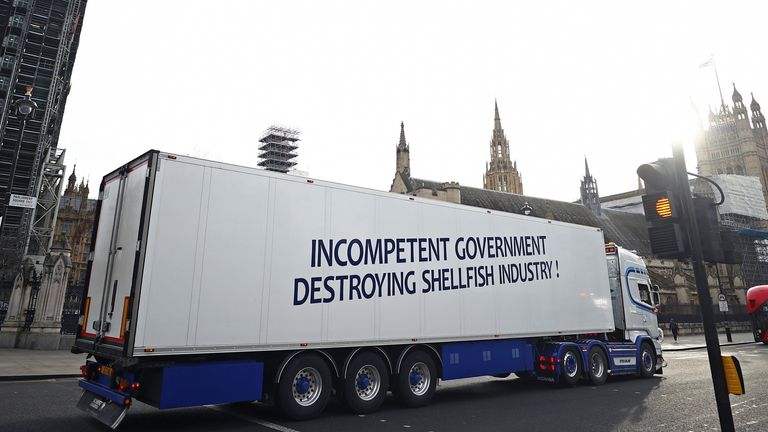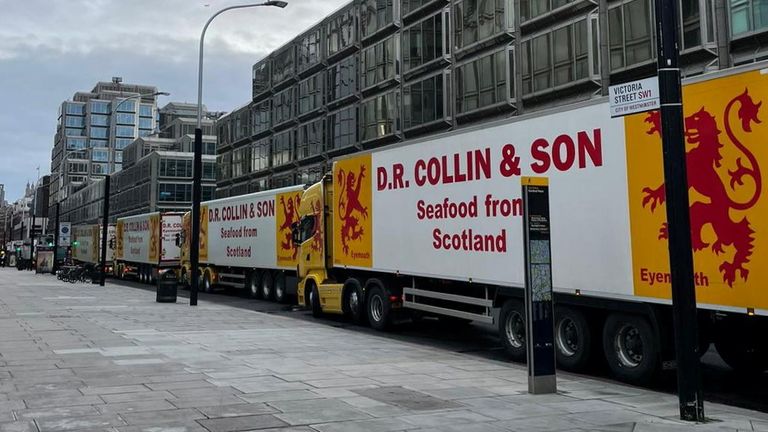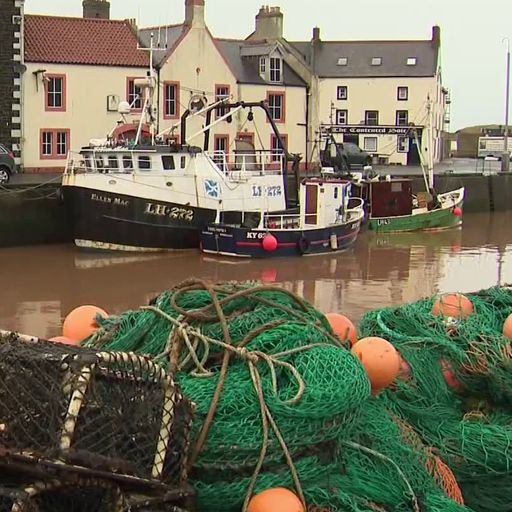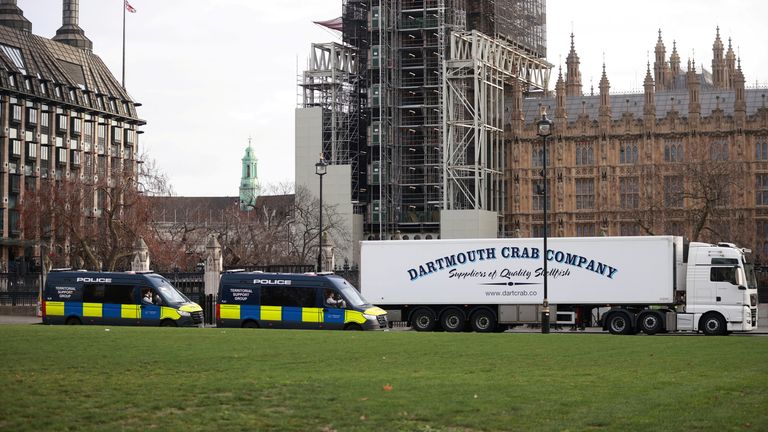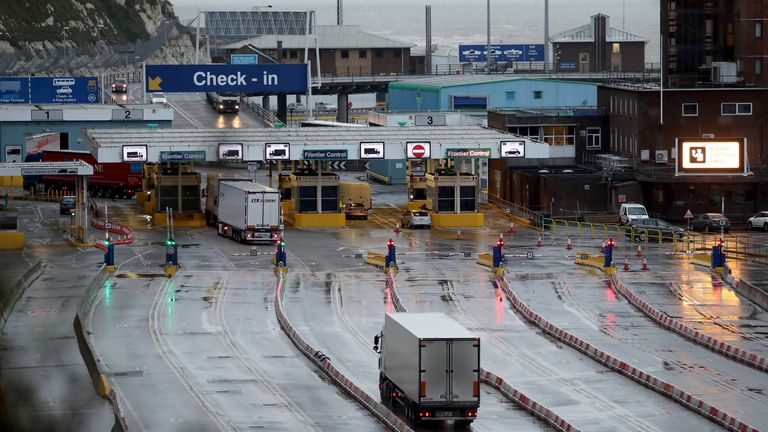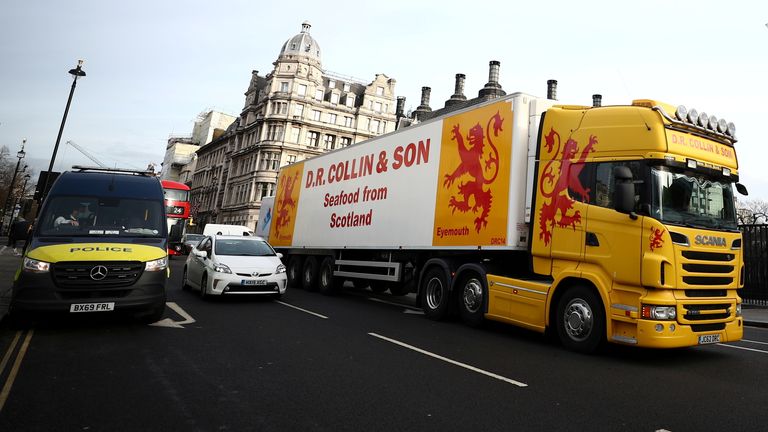Brexit: Seafood lorries park near Downing Street in protest over new rules causing severe delays at EU border
Seafood companies have warned they could go under in days as they face long delays getting into the EU, ruining produce.
Monday 18 January 2021 15:58, UK
Lorries used to transport British seafood have parked on the roads near Downing Street in protest over delays getting into the EU due to new Brexit rules.
More than 20 large lorries from seafood companies across the UK were parked up, with one carrying the slogan "Brexit Carnage" while another said: "Incompetent Government Destroying Shellfish Industry!"
Over the past few days there has been a suggestion that drivers will dump their wasted stock outside Downing Street, but so far this has not happened.
Many British fishermen have been unable to export their stocks to Europe since the start of the year after the introduction of catch certificates, health checks and customs declarations have meant lengthy delays getting into the EU.
European buyers have been rejecting their catches as they are taking too long to get to them, costing producers tens of thousands of pounds per lorry in some cases.
Following the protest, Boris Johnson said a £23 million compensation fund is in place to help British seafood companies who had a genuine buyer for their fish on the continent.
He said: "Where businesses - through no fault of their own - have experienced bureaucratic delays, difficulties, getting their good through where is a genuine, willing buyer on the other side of the Channel."
Britain exports vast quantities of scallops, oysters, lobsters, mussels, langoustine and crab to the EU, which were previously rushed straight to the continent after being harvested.
A spokesman for DR Collin and Son, which had several lorries at the protest, said the industry is "being tied in knots with paperwork requirements which would be easy enough to navigate" as companies have been preparing for some time for leaving the EU.
"However, all the training is going to waste as the technology is outdated and cannot cope with the demands being placed on it - which in turn is resulting in no produce being able to leave the UK," he said.
"These are not 'teething issues' as reported by the government, and the consequences of these problems will be catastrophic on the lives of fishermen, fishing towns and the shellfish industry as a whole.
"Action needs to be taken urgently to allow the procedures to be realigned in a manner which reflects the time restraints faced in the export of live shellfish to Europe."
Gary Hodgson, a director of Venture Seafoods, which exports live and processed crabs and lobsters to the EU, said he had cancelled several lorries since December due to the arduous red tape now involved with exporting to the EU.
He said one operator needed 400 pages of export documentation last week to board a ferry to the EU.
Those at the protest said the government needed to understand the severity of the problems they face and the impact on coastal communities, many who rely on seafood sales to the EU to survive.
They want a more workable system and say there is a shortage of custom agents on both sides of the Channel.
As he announced the £23m compensation fund, Mr Johnson added that he sympathised with exporters but said part of the problem was a collapse in demand as a result of coronavirus.
"Unfortunately, the demand in restaurants on the continent for UK fish has not been what it was before the pandemic, just because the restaurants have been closed for so long," he said.
Jimmy Buchan, chief executive of the Scottish Seafood Association, said they had seen little improvement in the fortnight since the new rules were in place.
He said: "There has been a lot of direct engagement between the industry and ministers and civil servants in recent days, and plenty of soothing words about resolving 'teething troubles'.
"But these are not minor impediments to trade. The industry in Scotland has basically ground to a halt and businesses that employ hundreds of people in communities around our coastline are losing money.
"In some cases they are close to going under.
"It is time for our government to get a grip of what is now a full-blown crisis, and fast, before severe and lasting damage is done to the sector."
A spokeswoman for the Department for Environment, Food and Rural Affairs said: "We recognise that the fishing industry is facing some temporary issues following the end of the transition period, some of which are the responsibility of devolved administrations and some the responsibility of UK Government, and we are looking at what additional financial support we can provide to those businesses affected.
"We continue to extensively engage and work closely with representatives of the industry from across the UK, and the authorities in EU Member States, to understand and address any issues with documentation.
"Our priority is to ensure that goods can continue to flow smoothly to market."
The seafood industry has warned fishing businesses could collapse within days, but Foreign Secretary Dominic Raab on Sunday said the delays were just "teething problems".
He told the BBC he was "not convinced" the delays were because of the government's trade deal with the EU and argued it will "create huge, sustainable opportunities" for the sector.

